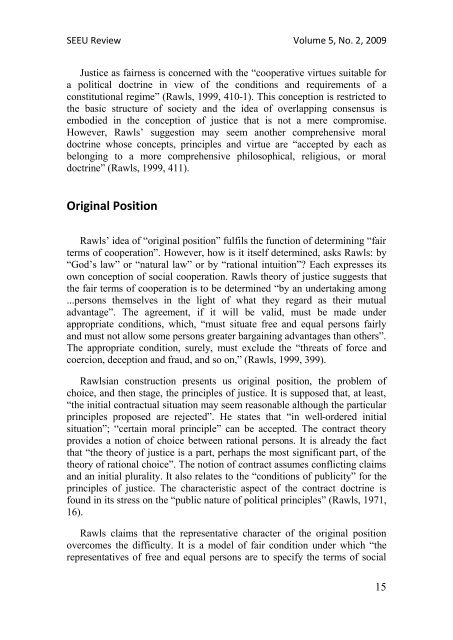SEEU Review vol. 5 Nr. 2 (pdf) - South East European University
SEEU Review vol. 5 Nr. 2 (pdf) - South East European University
SEEU Review vol. 5 Nr. 2 (pdf) - South East European University
Create successful ePaper yourself
Turn your PDF publications into a flip-book with our unique Google optimized e-Paper software.
<strong>SEEU</strong> <strong>Review</strong> Volume 5, No. 2, 2009<br />
Justice as fairness is concerned with the “cooperative virtues suitable for<br />
a political doctrine in view of the conditions and requirements of a<br />
constitutional regime” (Rawls, 1999, 410-1). This conception is restricted to<br />
the basic structure of society and the idea of overlapping consensus is<br />
embodied in the conception of justice that is not a mere compromise.<br />
However, Rawls’ suggestion may seem another comprehensive moral<br />
doctrine whose concepts, principles and virtue are “accepted by each as<br />
belonging to a more comprehensive philosophical, religious, or moral<br />
doctrine” (Rawls, 1999, 411).<br />
Original Position<br />
Rawls’ idea of “original position” fulfils the function of determining “fair<br />
terms of cooperation”. However, how is it itself determined, asks Rawls: by<br />
“God’s law” or “natural law” or by “rational intuition”? Each expresses its<br />
own conception of social cooperation. Rawls theory of justice suggests that<br />
the fair terms of cooperation is to be determined “by an undertaking among<br />
...persons themselves in the light of what they regard as their mutual<br />
advantage”. The agreement, if it will be valid, must be made under<br />
appropriate conditions, which, “must situate free and equal persons fairly<br />
and must not allow some persons greater bargaining advantages than others”.<br />
The appropriate condition, surely, must exclude the “threats of force and<br />
coercion, deception and fraud, and so on,” (Rawls, 1999, 399).<br />
Rawlsian construction presents us original position, the problem of<br />
choice, and then stage, the principles of justice. It is supposed that, at least,<br />
“the initial contractual situation may seem reasonable although the particular<br />
principles proposed are rejected”. He states that “in well-ordered initial<br />
situation”; “certain moral principle” can be accepted. The contract theory<br />
provides a notion of choice between rational persons. It is already the fact<br />
that “the theory of justice is a part, perhaps the most significant part, of the<br />
theory of rational choice”. The notion of contract assumes conflicting claims<br />
and an initial plurality. It also relates to the “conditions of publicity” for the<br />
principles of justice. The characteristic aspect of the contract doctrine is<br />
found in its stress on the “public nature of political principles” (Rawls, 1971,<br />
16).<br />
Rawls claims that the representative character of the original position<br />
overcomes the difficulty. It is a model of fair condition under which “the<br />
representatives of free and equal persons are to specify the terms of social<br />
15

















